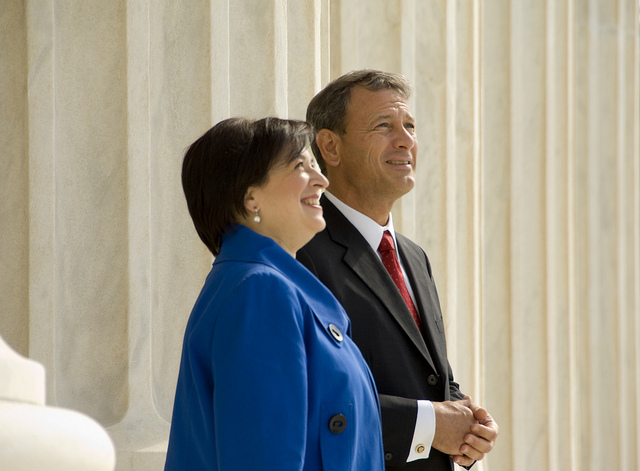
By Ciara Torres-Spelliscy
On Wednesday April 29, the US Supreme Court surprised many by upholding a restriction on judicial candidates’ soliciting campaign contributions in a case called Williams-Yulee v. Florida Bar. This so remarkable because ever since 2006, when Chief Justice Roberts and Justice Alito arrived in black robes, the Supreme Court has taken a significant chunk out of every campaign finance law that has been considered. This case breaks that streak.
Williams-Yulee was also surprising because the matter involved a ban on solicitations of campaign funds which were otherwise legal for donors to give to candidates. As second circuit Judge José A. Cabranes, once put it when considering a different solicitation ban that was eventually invalidated: “Whatever may be said about whether money is speech, speech is speech, even if it is speech about money.” Thus restrictions on solicitations are particularly vulnerable to judicial review because they are a regulation of speech that is protected by the First Amendment.
Finally, Williams-Yulee was peculiar because of the composition of the majority of the court. Typically since 2006, Justice Kennedy has been in the catbird seat at the Supreme Court. In a typical term Justice Kennedy is in the majority over 90 percent of the time because he makes the majority in an otherwise ideologically divided court—if he joins the liberals, they win; if he joins the conservatives, they win. But in this case Justice Kennedy was in the minority. Instead Chief Justice Roberts joined the liberal wing and wrote the opinion for the court.
The inevitable conclusion is the Supreme Court thinks that judges are different than other elected officials and judges can be held to a higher standard of conduct.
The difference between the Florida rule and other money in politics laws that have been subject to a death by a thousand cuts at the Supreme Court is the Florida rule applied to judicial candidates. This may remind some court watchers of Caperton, a case from 2009 in which the Supreme Court held that elected judges must recuse themselves when a large campaign contributor is litigating a case before them. When Williams-Yulee is read together with Caperton, the inevitable conclusion is the Supreme Court thinks that judges are different than other elected officials and judges can be held to a higher standard of conduct.
As Chief Justice Roberts wrote in Williams-Yulee, “Judges are not politicians, even when they come to the bench by way of the ballot. And a state’s decision to elect its judiciary does not compel it to treat judicial candidates like campaigners for political office. A state may assure its people that judges will apply the law without fear or favor—and without having personally asked anyone for money.” As a resident of Florida, Williams-Yulee is welcome news. At least our elected judges won’t be working the phones dialing for dollars for the next campaign. Rather our judges can do the hard work of writing opinions, issuing TROs and crafting equitable remedies.
This decision will have an impact far outside of Florida since thirty-eight other states elect at least some of their judiciary. And thirty states have rules similar to the Florida rule that keep judges from soliciting campaign funds. Thus not only does Florida get to keep its rule for judges, so do thirty states. This is an important bulwark to protect the integrity of the judiciary. The Chief Justice found that this was a compelling state interest that justified having the rule. As he wrote, “Judges, charged with exercising strict neutrality and independence, cannot supplicate campaign donors without diminishing public confidence in judicial integrity.”
Unfortunately, Williams-Yulee cannot solve the bigger problem of privately funded judicial election: that too frequently, the very lawyers who practice before the judge donate to her campaign chest. Caperton puts recusal on the table for very big donors, but this is only a partial solution. As Justice at Stake has documented for years, the price of running for judicial office continues to skyrocket. And troubling studies from Emory Law indicate that judges appear to rule in favor of business interests that provided campaign funds more frequently.
Public financing for judicial elections would be better than the fig leaves of stopping judges from personally asking for private money or recusal when a really big donor is in the court room.
So this is a moment for the nation to stop and think about the reason even Chief Justice Roberts ruled in favor of this limitation for judicial candidates. Quoting Alexander Hamilton, he wrote: “The importance of public confidence in the integrity of judges stems from the place of the judiciary in the government. Unlike the executive or the legislature, the judiciary ‘has no influence over either the sword or the purse…neither force nor will but merely judgment.’”
To get judges out of the current bind of raising private campaign money, more states should adopt public financing for judicial elections. That would be better than the fig leaves of stopping judges from personally asking for private money or recusal when a really big donor is in the court room. But in the meantime, the fact that the Supreme Court is recognizing that there are problems created by fundraising judges is a step in the right direction.

